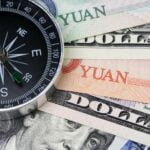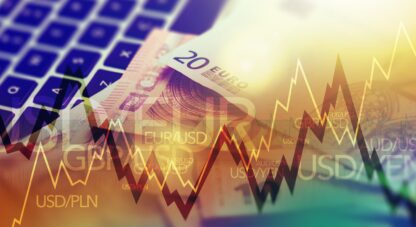Podcast: Play in new window
- Can This Be Called Another Powell Pivot?
- Chinese Selling Of U.S. Treasuries To Buy Gold Cannot Be Ignored
- FED “Slows” Tightening Instead of Cutting Rates
“Powell would have to embrace potentially unbearable political pressure to resolve the inflation problem. What are the odds of him doing so in an election year? Claims of political independence. This is where our central bank, we kind of hold ourselves out as the shining example of being politically independent. Well, we claim that, but I think those claims are wrecked on the shoals of very shallow and slim odds of a Biden victory in November. There’s too much of a risk that Trump is re-elected for the Federal Reserve to take the risk of throwing us into a situation where we could resolve inflation on the one hand, but to do so would cause a transitory increase in unemployment and a transitory reduction in the rate of growth of output—that is, GDP growth. Is that going to happen? No.” –David McAlvany
Kevin: Welcome to the McAlvany Weekly Commentary. I’m Kevin Orrick, along with David McAlvany.
Well, David, I hate to say this, I might be saying it a little bit ironically, but I saw a T-shirt that Taylor Swift was wearing. I’m not much of a Swiftie, but it said, “Not a lot going on at the moment.” That was the T-shirt. “Not a lot going on at the moment.” Gosh, don’t you wish that was the case for the Commentary?
David: Not a lot going on. Yeah, we’ve got Israel’s conflict with Hamas, Chinese overtures to Hungary, Serbia, and France. We’ve got Russian escalation of terror attacks in continental Europe and the UK, including Wales, Chinese aggressions in asserting territorial control to the nine-dash line, which spills over into a handful of countries’ maritime waters, Warren Buffett dumping a meaningful amount of Apple stock, only 115 million shares.
Kevin: Oh, you think? Meaningful?
David: Building the cash hoard at Berkshire to a record level of $189 billion. As previously noted, significant insider selling is the patterned behavior in the C-suite, including nearly 200 million in JP Morgan shares by its CEO. Nope, no news is bad news when the greed impulse is alive and well on Wall Street.
So, not much going on as long as you’re feeling good and speculating like it’s 1999. Each of these tidbits is worth ruminating over and discussing, and all of them are largely ignored. We’ve got Powell’s comments keeping the limelight, in an essence displacing those other factors from our collective consciousness.
Kevin: So I’m going to send Powell that T-shirt, I think, “Not a lot going on at the moment,” because I think that’s what he’d like us to think.
David: Well, last week, Powell fed the beast. “It’s not about inflation numbers or quarterly results.” I mean, in some sense, data is mundane if you find it to be inconvenient or inconsistent with what you want it to say.
Kevin: Not a lot going on at the moment.
David: Right.
Kevin: Yeah.
David: It’s really about belief, and he has belief in spades. Inflation will come down to the 2% target, so he believes. Evidence aside, data aside, his confidence level is, unfortunately, inconsistent with the context of persistent inflation and the factors that are likely to meaningfully stoke it in the months ahead. Two things come to mind. We’ve got Chinese financial market stimulus on a very large scale, and a meaningful bump in energy cost, because if we go back to the conflict between Israel and Hamas, the incursion into Rafah and the Middle East’s response to that, which will happen over the next few days, we can assume that we are going to see some pressure on energy prices.
So although Powell did not indicate that a rate cut was eminent, he did reduce the Fed’s rate of balance sheet shrinkage. In other words, QT, which is shrinking back all of the QE that had been put in motion, he’s no longer shrinking back at the same rate they were projecting. So, it leaves a different kind of higher-for-longer on offer, which speculators love. They’re keeping the balance sheet bigger, or higher for longer, and that keeps ample liquidity in the system. So financial conditions remain loose, which speculators love. Powell gave the green light.
Kevin: Yeah, he wore the T-shirt, “Not a lot going on for the moment.” But you know, what that does is, for the person who’s trying to hedge against that, that squeezes them pretty hard because they may be looking at reality, but Powell has the liquidity.
David: Yeah, we witnessed an everything squeeze last week with hopes revived, luring lemmings back towards the market high places. Goldman Sachs’s Short Index moved higher by 8.6% for the week, and that’s on top of the previous week’s gains of 4.3%. These are big moves. The yen rebounded 3.5% in one of its more volatile weeks ever, breaking down past 160 on Monday, and then recovering in fits and starts all week long. It seemed like the Bank of Japan was doing what they could to keep traders happy, passing sake bombs in order to boost confidence for at least a few days.
Kevin: I’ll take one of those sake bombs. I like sake.
David: And the bar tab summed to nearly 60 billion, 59 billion for the week. That’s estimated by traders, not officially acknowledged.
Kevin: That’s all it cost, huh?
David: That’s a lot of liquidity, 59 billion. But for perspective, 59 billion, if you annualize that, that’s roughly on a track for three trillion. Obviously, they’re not going to spend that. But if you think about, just for comparison’s sake, Beijing’s liquidity infusions last year were five trillion, so 96 billion a week, and this year’s Chinese credit expansion is also quite impressive, on track for $4.7 trillion. That’s trillion. These are numbers that are hard to fathom, and of course, the US is no slouch in terms of credit growth either. Bottom line is, all’s well that ends well, or I guess you could look at that in reverse, all is not well that ends poorly. That will just take some time to play out.
Kevin: I was going to say, you wonder how these people are going to be remembered in history who are making these liquidity decisions now.
David: Yeah, difficult to hide the shame of the policy errors as history records the choices that are made and their eventual effects.
Kevin: But it is. It’s like an illusion when you can stimulate artificially by printing money or reducing or not reducing quantitative easing.
David: Yeah. Currency interventions like we’ve seen with the Bank of Japan, they’re, of course, different than credit market smoothing operation and the artificial economic stimulus caused by credit growth. So when we’re talking about $4.7 trillion in credit growth in China this year, five trillion last year, multiple trillions in the US, again, that is different than a currency intervention.
But the scale of extraordinary activity is comparably large, and that’s worth considering. These are huge numbers being deployed to maintain “normal” economic activity. And again, we lose track of the meaning because they’re so big, gloss over the scale, and begin to assume it’s normal. If it doesn’t mean anything, we just kind of assume, “Okay, this is what it takes. This is what is normal.”
If we’re adjusting to these numbers, that is a form of maladjustment, as much as liquidity itself. Sometimes we call it investment, it provides the means for malinvestment. So you can call it investment become complacent in treating it as normal, and I think you join the ranks of the surprised when this whole thing blows up, as it inevitably will. It’s the nature of boom and bust cycles.
Kevin: I think sometimes it’s good for us to look back just a few months. Just a few months ago, we started this year with the expectation of what, five rate cuts, something in that neighborhood? And then it reduced itself all the way down to the expectation of maybe one toward the end of this year.
David: Yeah, it actually stretched to seven, was the expectation priced in, between six and seven, and then you’re right, cut to one at the beginning of last week. So, started the week with an expectation of a single rate cut by December. The interest rate markets are back to pricing in two interest rate cuts. While we have no proof or evidence of inflation receding, we go back to belief. We do have ample faith in the Fed.
Kevin: Oh, of course. Long live the Fed.
David: The critical factor in last week’s market reversals to the upside was Powell’s conference midweek. As one colleague described it, Powell’s Jedi mind trick, the wave of the hand and the dismissal of both stag and flation was all the market needed to be reassured and motor higher. And it was one part mind trick, but the other part was tangible gift. Hard Asset Insights reported Judy Shelton’s question, “If worried about inflation above target, why slow down tightening by reducing the runoff from the Fed’s portfolio?” And then she answers her own question. “Seems like a concession to those who want lower rates without actually going for the rate cut.” She’s right. Your own Q&A recharacterized Powell not as a Jedi with Force-wielding power, but more like a cheap magician using distraction and sleight of hand not unlike the Wizard of Oz. Just don’t pay any attention to the man—Powell—behind the screen.
Kevin: I love how you likened it to Jedi mind tricks, because in one of the movies we see that Jedi mind tricks don’t work on everybody, and Janet Yellen now is having to run around the world trying to beg people to buy our Treasury bills. The rest of the world’s a little concerned about our inflation.
David: Well, that’s right. So you’ve got both on the national team. Powell, he’s moving basis points around, pledging to destroy inflation, justify a lower interest rate environment. Yellen, on the other hand, scurrying around the globe seeking support for the Treasury markets to avoid the inevitable rise in rates should we lose our largest investor base in Treasurys. And that’s a real concern. If you’re going to run the same deficits, you’ve got to have somebody who’s stepping in to fund those deficits and lend you money. If you’re going to increase your deficits, you at least—at a minimum—have to maintain the old buyers and then find a new source of buyers as well. In this case, we are in fact raising the deficits and we’re beginning to lose our old buying crowd.
Kevin: Well, the Jedi mind tricks aren’t working on the Chinese anymore.
David: No, no, no. The most recent TIC flows show China quietly letting go of another 23 billion in Treasury holdings, to a level last seen in 2009. We’re about 755 billion. That’s the new total Treasury holdings by the Chinese. I think the peak was just shy of 1.2 trillion in 2017.
Kevin: Well, they’re raising liquidity and doing something with the liquidity, Dave, and we’re seeing premiums on the Shanghai exchange for gold, what, at 135 bucks over bars?
David: At its peak. Now they’re probably closer to 35 today, but they will go as high and have gone as high as 100 to 125, $135 an ounce. So just note to self, note to self, Chinese selling of US Treasurys and buying of gold is not something to ignore. Is it a coincidence that these are happening at the same time? It’s unlikely. Some argue that Treasury selling is more of a shift to agency paper, but that ignores how 2022 marked a dramatic shift in trust within the reserve asset community, including China.
Kevin: But is it any surprise when we’re actually reallocating people’s money if they’re not popular with the worldview that’s being presented?
David: Yeah, Euroclear, which is based in Belgium, was the custodian for most of the Russian reserves which were seized at the behest of the US Treasury. Think about that in terms of, whose law is Euroclear subject to? Is that EU law? Is that Belgian law? Is that US law? It’s a fascinating construct.
Kevin: Those Russian assets would be mine now. They’re mine now.
David: So Euroclear is the custodian for the Russian assets. They’re seized as the US Treasury instructs them to. There’s also Clearstream in Luxembourg. Combined, those two entities custody 50 trillion in assets. They’re the biggest banks you’ve never heard of.
Kevin: That’s a lot of assets.
David: Should I say that again?
Kevin: 50 trillion, wow.
David: 50 trillion in assets. Well, gold is not a reserve sitting in a European entity, easily poached when sanctions or other forms of pressure need to be applied. The latest form of warfare is what you see unfolding. It’s economic in nature.
Kevin: And if you can’t trust the person that you’re dependent on, you just go somewhere else. Gold is that somewhere else.
David: So gold is control. Gold is a workaround for a system deemed to be biased and dangerous, and if you step out of the liberal democratic compliance, you can expect to get hammered. So gold gives you an opt-out, a workaround for liberal democratic non-compliance, if you will.
There is an interesting point to be made about ditching Treasurys, and the larger context is one in which countries want to be—reserve asset managers want to be—insulated from geo-economic and geopolitical pressures, so they’re favoring gold as a reserve asset. That trend will continue as long as the world divides between autocratic regimes and the Western world.
There will be more to discuss on this topic of ideological divides and the rejection of liberal democracy by the Chinese, the non-Western, non-Anglosphere malcontents. In a few weeks we’ve got Paul Tucker joining us again. You might recall our last conversation with Paul, previously at the Bank of England, now he’s teaching at the Kennedy School at Harvard. We spoke about his book Unelected Power—really intriguing read, very insightful. And so, too, is his more recent book, Global Discord.
Kevin: And I’m looking forward to that interview because the last one was really a great interview, and his book really influenced you, Dave. It comes up in conversation all the time. But I’m thinking about what Yellen is trying to accomplish here. She’s trying to sell the world on continuing to buy US Treasurys. What are the ramifications if they don’t?
David: Yeah, I think one of the things that’s really critical in Paul’s book Global Discord is that the struggle between world powers, both geo-economic and geopolitical in nature, is one that he sees stretching through decades, maybe even a century. This is not something that is going to be resolved at the next soiree in Beijing or in London or in St. Petersburg or in Rio. No, this is something that— We’re dealing with a conflict of worldviews, a conflict of how individuals are valued, how law is perceived. Are we dealing with the rule of law, which again, is what we have in Western—
Kevin: Protects the individual.
David: —liberal democracies focusing on the individual? Or is it rule by law, where again, you’re dealing with a totally different construct—
Kevin: Protects the collective.
David: —different idea and valuation scheme for who’s important within society and how we value within society.
Kevin: And he sees that as irresolvable.
David: Well, that’s right. No, these are irreconcilable differences, these are worldview differences, and they feed into what we view as a world order. So global discord values and power in a fractured world order. It is fractured for a reason, and this is not a Humpty Dumpty just putting it back together again. We’re dealing with two separate minds that cannot be melded.
Kevin: But what allowed us to get away with an awful lot, Dave, was we had a symbiotic relationship with those who believe in the rule by law and the West who believes in the rule of law as long as they were borrowing from us or we were borrowing from them or we were buying from them, and vice versa. But what we’re seeing right now— I’m going to go back to my question with Yellen running around trying to get them to buy Treasurys, what happens when that symbiotic relationship breaks down and they don’t want to loan us money anymore?
David: Well, just like Chinese selling of US Treasurys and buying of gold is not something to ignore, neither would I ignore the fact that we have a Treasury Department doing a dog and pony show raising interest and enthusiasm for our debt, or at least attempting to do so. Yellen is in sales mode. If foreign demand wanes further, then domestic financing is the only alternative, and that’s not a great input on the inflation front. Monetizing debt is one option, and again, that feeds back into inflation pretty quickly. We experimented with that in the ’70s, but we’ve got pretty short memories, so maybe we’ll try it again.
Talk about supercharged inflation. You’re in essence tying the monetary machinery to the funding of fiscal needs. It’s not constructive for currency credibility, to say the least, but there’s a second alternative, and that is conscripting capital and forcing debt allocations onto households, onto financial firms, and potential losses onto savers. This is financial repression. Financial repression is some combination of inflation and channeling capital flows where you want it to go. Financial repression is an expression of financial desperation, and that is what you find yourself experiencing if you don’t have a ready buyer. We need the Chinese Treasury buyer. We need the Japanese Treasury buyer, too.
Kevin: Yeah, we need people to loan us money because we have huge, huge deficits. But Dave, let’s look on the bright side. Let’s look at Japan. I remember when I was a kid, Mexico was the place to go because your dollar went so far. The peso would just devalue and you could just buy twice or three times the types of goods down there for the same price. But Japan’s becoming that way. Remember how expensive Japan was to visit, and now where’s the yen?
David: Yeah, this is kind of an interesting comparison or contrast. We used to take groups of investors to South Africa, and this is when 70% of the world’s gold supplies were coming from one country. And so, if you had an interest in gold, this was the place that you wanted to focus on in terms of supply and demand.
Kevin: It was, what? 30-some-odd trips back to South Africa back in the ’80s with your dad.
David: And the exchange rate, the dollar:rand exchange rate was better than four to one, so it allowed you to put on a five-star tour, but it was 25 cents on the dollar. So we could actually take a tour down there and turn a profit doing the tour itself because it was lavish, but it didn’t cost us an arm and a leg.
In 1990 and 1992, I went with my dad to Asia. We did similar tours, and we lost our shirts. I mean, it was very costly.
Kevin: Because of the currency.
David: Because of the currency, the yen at the time was far more robust, and I remember we had one breakfast. They set out the buffet and it was inadequate. It didn’t feed everybody, and so we asked for them to just replenish, replenishing cost $20,000.
Kevin: Wow.
David: Replenishing was an extra 20. But again, that was because the yen was strong. So returning to Japan for a moment, record levels of inbound foreign visitors to the island, specifically the [unclear], are a signal of value seeking world travelers. They’re taking advantage of the yen’s 34-year extreme low, where most foreign currencies are buying a lot more stuff in yen terms.
The flip side is that Japanese citizens are having a hard time traveling. Traveling outside Japan has hit a cliff because your currency isn’t buying very much. Therefore, as you go through the exchange rate, a shift to whether it’s a pound sterling or US dollars or what have you, it’s just too expensive.
The cost of living is on the rise for Japanese households. Wage increases are not keeping up. You see a shift that’s a generational shift. Households in Japan, they’re going back to gold as a savings tool. An old favorite that had fallen out of favor for a generation, but it’s making a comeback. Again, you’ve got these foreign exchange rates which make everything far more expensive outside the country. Corporate executives are now reaching their limits of toleration for yen weakness.
Kevin: Isn’t this an indication, though, of how inflation, it’s actually sweet in the beginning because it accomplishes a lot of what really looked like great things, and then it’s sour? It reminds me—in the book of Revelation, the author of Revelation is given a small scroll and he’s told to eat the scroll and it would be going down sweet as honey, but it would then be sour in his stomach. Isn’t that a lot like inflation?
David: It sounds like playing euchre with some friends of ours. If we lose too badly, we just take the score sheet and eat it. The front edge of a devaluation provides an improvement to export competitiveness. So, I don’t think devaluation is ever fun for households, for individuals, but at least for corporations, there is the export competitive advantage.
Kevin: That’s the sweet as honey, right there, yeah.
David: Typically an increase in corporate profits, and so Japanese markets have reflected that, with the Nikkei finally retaking its peak, 1989 levels.
Kevin: Can you believe that? It took 35 years. I remember when I first came to work here that Nikkei was hitting a high. We haven’t been there since then.
David: 35 years ago. Long time for a bull-bear cycle to play out.
Kevin: Wow.
David: And not many current investors have a recognition or realization that it can take 15, 20, in this case, almost 40 years. But eventually input costs start to squeeze margins. So at the front edge of a devaluation, that’s fine, but eventually input costs start to squeeze margins, particularly, you think of Japan, a country that has to import raw materials to make stuff. So you’ve got the second stage of inflation, it’s not as nice as the first.
Kevin: That’s the sour.
David: Bank of Japan had to act, and will now have to act further to fight what is the equivalent of currency gravity. The yen wants to go lower, and speculators are going to push it lower, and now you’ve got to fight. And the Bank of Japan is fighting that currency gravity.
Why is there further downward pressure on the yen? Heavy, heavy debt dynamics which skew the Japanese balance sheet. In all likelihood, continue to show up as pressure on the currency. We haven’t yet seen financial market frailties on display stemming from a rise in Japanese rates.
Remember that’s what we saw last year. Massive mark-to-market losses on bond holdings. That was what sank SVB, Silicon Valley Bank, and First Republic and others. But this can happen in Japan. If rates do continue to rise, all kinds of issues emerge for Japanese financial firms, Japanese banks, Japanese household savers, and of course the Bank of Japan itself, which owns half of the country’s debt. What happens to the value of the debt as interest rates rise? The price goes lower.
Kevin: So we go from the sweet to the sour. But they’ve been intervening, Dave, with tens of billions of dollars to keep that sour from ruining them.
David: Yeah, I think the yen saga is far from over. The fight for the currency, it’s going to take more than 59 billion in a week. I have a recommendation for you this weekend. Here’s what we’re going to do as a family on Friday. Mary Catherine’s out for the next several weeks. She’s playing Velma Kelley in Chicago, so she’s rather busy these days.
Kevin: In the musical Chicago?
David: Yeah.
Kevin: Yeah. Not in Chicago, but she’s in the musical Chicago. That’s pretty impressive.
David: The rest of us, because we’ve already seen it a couple of times, the rest of us are going to watch Akira Kurosawa’s Seven Samurai. And I realize I haven’t shown this to the kids. It is an amazing piece of work from the mid-1950s.
Kevin: I don’t think I’ve seen it.
David: ’53, ’54.
Kevin: Really?
David: Yep. 1954 I think is when it came out. But I’m going to precede it, maybe I’ll follow it, by a family discussion on the yen. I mean, of course, their interest level is going to be virtually nil. So this is the reality as we talk about a lot of things in the family, and it’s like throwing spaghetti against a wall. Occasionally, something sticks.
Kevin: Yeah, but you’re tireless. You’re going to talk about the economics, the politics.
David: I want to talk about carry trade dynamics, excessive levels of debt to GDP, controlling interest rates, keeping them at unnatural levels, which we’ve seen in Japan. Now, currency interventions, maybe look at a brief history of the boom and bust dynamics which lifted Japanese valuations to unsustainable levels. I mean, keep in mind, the palace, which is downtown Tokyo, was valued, at the real estate peak in Japan, at a higher level than the entire state of California.
Kevin: Wow. Wow.
David: I mean, the palace, I’ve walked around the palace, it only takes you about 15 minutes. Right?
Kevin Orrick
And it was worth more than California,
David McAlvany
More than every square inch in the state of California. When you think of asset prices going to the moon and then there being a correction, 35 years to recover. And, okay, I’m going to have a little sake, and maybe we’ll discuss the yen pressure as a preview of coming attractions—
Kevin: This is with your family when you’re watching The Seven Samurai?
David: —for the number one currency. Is this a preview of coming attractions for the number one currency in the world, the US dollar? I get it. There are as many differences as there are similarities between the dollar and yen, but we should be well versed in central bank balance sheet dynamics and currency credibility.
Here’s a book for the library. Richard Koo described it best in his book Balance Sheet Recession, and he looks at the Japanese situation, but it is a great analog to the US. And you can build the case for inevitable recession as your balance sheet gets way out of whack, as theirs has been for, oh, a couple decades.
Kevin: Well, there is something about being a McAlvany in the McAlvany household. There’s good food. You guys like cooking together.
David: We do.
Kevin: There’s usually good movies. You guys like watching good movies together, and you think those things through. But if you’re going to talk to your kids while your wife’s doing the musical Chicago about carry trade dynamics and excessive levels of debt-to-GDP and tie that all in, I wonder if they’re going to want to just go play video games, Dave.
David: And they do. And so the art is how to keep the attention of a 10-year-old, a 13-year-old, and a 16-year-old and an 18-year-old. Typically, I can get a little bit of traction with the 16-year-old and the 18-year-old, and the 10-year-old is antsy, always antsy.
Kevin: You know how you could tie this in, though, Dave? What you could do? Show them the samurai because the samurai were actually defending the weak and the needy. And then tie it in to economics. I mean, have we had those types of defenders of the weak and the needy in the economic sphere?
David: William McChesney Martin was one of those defenders. He was popular for saying you need to take away the punch bowl before the party gets started. In other words, you would introduce restrictive monetary policy before you got to excessive valuations in the financial sphere, which would then feed over, looking at the Cantillon effect, into consumer prices.
Kevin: So he didn’t yield to the politics that they do today?
David: No. So in that sense, there was an age when central bankers had a mind for not only banks and stability within the banking system, but even the underdog, and the need to fight for the underdog.
There’s a great theme there in The Seven Samurai. You’ve got the farmers, simple peasants, and they’re defended by warriors from thieves and brigands. And I’m not exactly sure, if we’re using this as an analogy, maybe it breaks down quickly because I’m not sure that the central bankers aren’t the thieves and brigands today instead of the samurai. But Volker was our samurai. Though many would critique his actions as triggering recession and an increase in unemployment, he embraced pain to avoid even more pain in the future.
Kevin: And do you remember, Reagan could not stand him?
David: Of course.
Kevin: Yeah. Reagan wasn’t going to get re-elected if Volker continued to do what he was doing.
David: But that is a nobility and a sobriety which we seem to lack in today’s central bank community, a perspective absent from our policies. We want to defer paying the price for as long as possible. Kurosawa’s film is considered one of the best ever made, and Volker, I don’t know if he’s one of the central bankers’ best ever made, but he’s one of a rare breed of central bankers that knew— He knew international diplomacy as well as he did central banking. In that sense, he was like the two or three sword guy. He could handle the conflicts with the long sword or the short sword as battle increased and the quarters closed in.
He was bold, he was brash, he was unloved by many. He was respected by most, but you know what he did? He killed the inflation which was raiding and plundering household resources in the 1970s. By contrast, we’ve got—well, today’s more pushover Powell, proving to be more limp noodle than daishō-wielding warrior. Perhaps harder times will force a deeper resolve and bring out the best in Powell. It usually does with Americans. The worse things get, the better we become, and it takes real crisis for us to shed weakness and exude strength. I hope we see that with Powell.
Kevin: Since you’re bringing up the samurai, if you want to read a book about resolve, I think it was five or six hundred years ago, a samurai named Miyamoto Musashi wrote a book called The Book of the Five Rings. Actually, it’s a fascinating book because it doesn’t play with theory, it plays with fact. And speaking of inflation, if we’re going to tie that in with Volker and McChesney Martin, what did Milton Friedman say about how you fight inflation? It’s probably pretty simple.
David: “The only cure for inflation is to reduce the rate at which total spending is growing.” This is Friedman, “There’s no way of slowing down inflation that will not involve a transitory increase in unemployment and a transitory reduction in the rate of growth of output. But these costs will be far less than the costs incurred by permitting the disease of inflation to rage unchecked.”
Kevin: And if you do that with resolve, you will stop inflation.
David: Powell would have to embrace a potentially unbearable political pressure to resolve the inflation problem. My question is, what are the odds of him doing so in an election year? Slim to none?
Kevin: Yeah, I doubt it.
David: Claims of political independence. This is where our central bank— We hold ourselves out as the shining example of being politically independent. Well, we claim that, but I think those claims are wrecked on the shoals of very shallow and slim odds of a Biden victory in November. There’s too much of a risk that Trump is reelected for the Federal Reserve—majority Democrats, by the way—to take the risk of throwing us into a situation where we could resolve inflation on the one hand, but to do so, just as Milton Friedman said years ago, would cause a transitory increase in unemployment and a transitory reduction in the rate of growth of output—that is, GDP growth. Is that going to happen? No. Political bias will feed through monetary policy. Tightening monetary policy further in response to a second wave of inflation, that would increase unemployment, which means they’re going to tolerate higher inflation for longer because they can’t risk throwing the election to Trump.
Kevin: Well, of course they’re going to send everybody the t-shirt, not just Taylor Swift. Not a lot going on at the moment.
David: I think it’s better to pretend inflation is dead, and try to convince the public that it’s been vanquished, and at the same time accommodate financial markets, which is exactly what happened last week, reducing QT. At the same time, you buttress the Treasury’s effort to refinance as much debt as possible on the best terms possible. No more rate increases. Kevin, I think that the samurais are absent exactly when you need them to hold the thieves at bay.
* * *
You’ve been listening to the McAlvany Weekly Commentary. I’m Kevin Orrick, along with David McAlvany. You can find us at mcalvany.com, and you can call us at (800) 525-9556.
This has been the McAlvany Weekly Commentary. The views expressed should not be considered to be a solicitation or a recommendation for your investment portfolio. You should consult a professional financial advisor to assess your suitability for risk and investment. Join us again next week for a new edition of the McAlvany Weekly Commentary.















